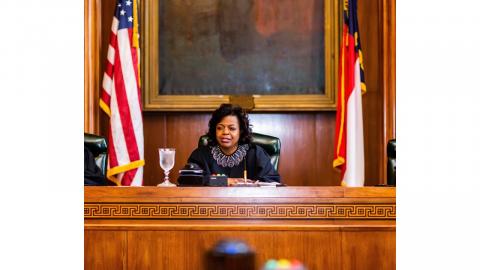Chief Justice Beasley Addresses the Intersection of Justice and Protests around the State
Article contents

Chief Justice Cheri Beasley held a press conference today, Tuesday, June 2, to speak about the intersection of the justice system and the protests occurring in cities and communities across North Carolina.
The press conference was held in the courtroom at the Supreme Court of North Carolina, downtown Raleigh.
Watch the video from the press conference.
Full Text from Chief Justice Beasley's Speech
I felt compelled to speak today about the pain and grief our nation is experiencing over the deaths of Ahmaud Arbery, Breonna Taylor, George Floyd and far too many others. Much of the pain is grounded in the belief that justice is perpetually denied in cases involving African-Americans.
Thousands of people of all different races have flooded the streets in large cities and small towns all over the nation. The despair presented by the COVID-19 pandemic has almost certainly intensified emotions. But that in no way discounts the gravity of the events that have caused these demonstrations. It is essential to understand the root cause of the pain that has plagued African-Americans and the complexities of race relations in America.
These protests highlight the disparities and injustice that continue to plague black communities. Disparities that exist as the result of policies and institutions; racism and prejudice have remained stubbornly fixed and resistant to change. These protests are a resounding, national chorus of voices whose lived experiences reinforce the notion that Black people are ostracized, cast out, and dehumanized. Communities are crying out for justice and demanding real, meaningful change.
It is shocking to see our workplaces, businesses and community spaces damaged. But we must recognize the legitimate pain and weight of years of disparate treatment that fuels these demonstrations. We must be willing to hear that message, even when we are saddened by the way it is delivered. We must decry the failures of justice and equity just as forcefully as we decry violence. It is not enough to say to protesters “go home and follow the rules.” It’s not that simple. We must hear each other.
As the mother of twin sons who are young black men, I know that the calls for change absolutely must be heeded. And while we rely on our political leaders to institute those necessary changes, we must also acknowledge the distinct role that our courts play. As Chief Justice, it is my responsibility to take ownership of the way our courts administer justice, and acknowledge that we must do better, we must be better.
When Chief Justice Martin convened a commission to study the justice system in 2015, that commission found that a majority of North Carolinians lack trust and confidence in our court system. Too many people believe that there are two kinds of justice. They believe it because that is their lived experience -- they have seen and felt the difference in their own lives.
The data also overwhelmingly bears out the truth of those lived experiences. In our courts, African-Americans are more harshly treated, more severely punished and more likely to be presumed guilty. There are many ways to create change in the world, but one thing is apparent: the young people who are protesting everyday have made clear that they do not intend to live in a world in which they are denied justice and equality like the generations before them.
We must develop a plan for accountability in our courts. Judges work hard and are committed to serving the public. But even the best judges must be trained to recognize our own biases. We have to be experts not just in the law, but in equity, equity that recognizes the difficult truths about our shared past. We must openly acknowledge the disparities that exist and are too often perpetuated by our justice system.
I’m excited about the many programs our courts have implemented to improve our work. We have expanded School Justice Partnerships, which help keep students in the classroom instead of the courtroom.
We are examining bail policies. Our pilot projects in eight North Carolina counties are already showing promising results that can be implemented statewide to truly bring change to a system that all too frequently punishes people disparately.
I am also very excited about our Faith & Justice Alliance where we will build partnership between places of worship and the legal system to bring services to people in their own communities. This Alliance will formally launch this week with a virtual meeting of lawyers, judges, community service providers and clergy -- people who truly understand the needs of underserved communities and know how to bring them the legal education and services they need most.
The work of improving justice is never truly done. Justice is not an achievement. It is a practice. As we change and grow as a society, our understanding of justice changes and grows and expands. And our courts must do the same.
We must come together to firmly and loudly commit to the declaration that all people are created equal, and we must do more than just speak that truth. We must live it every day in our courtrooms. My pledge to you today is that we will.
The recent deaths have once again shed light on the truth that injustice and discrimination still exist. And the protests that have followed have shown us just as brightly that we can come together in expressions of solidarity and grief. My hopeful prayer is that we continue to learn and grow together and that we have the courage to make change where change is so desperately needed.
We must come together to firmly and loudly commit to the declaration that all people are created equal, and we must do more than just speak that truth. We must live it every day in our courtrooms. My pledge to you today is that we will.